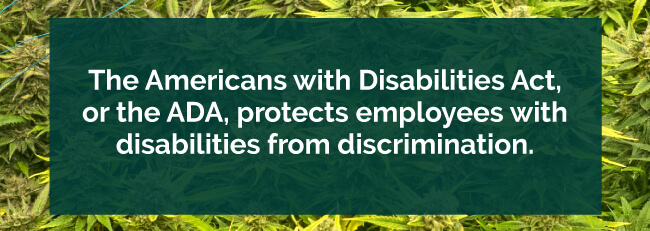
We’re at a turning point in the United States. More than 20 states have legalized medical marijuana use, with that number constantly growing. Many marijuana policies on state and federal levels have evolved as we learn more about medical cannabis, making some legal issues related to weed hard to understand.
As a medical marijuana patient in the workforce, one such issue is whether you can be terminated due to your medicine. While we’d love to say you’re completely protected, the answer is more complicated than that. To truly know if you can keep your job, you should keep your rights as an employee in mind when talking to your employer about your marijuana use.
In the United States, there are different types of laws that affect certain areas and populations. Federal law governs the entire country and are enforced in every state and municipality. State laws only apply to a certain state and don’t affect others states.
Federal law considers marijuana a Schedule I drug, a category of highly addictive drugs with no medical purpose. Other drugs in the Schedule I category include cocaine and heroin. People who use marijuana can still undergo steep consequences on a federal level.
Yet, many states allow their citizens to use marijuana medically. So, we currently have a divide between federal and state marijuana laws. While your state may let you use cannabis, federal officials can still technically prosecute you for drug use.
One example of this contradiction is the use of medical marijuana by non-US citizens in California. At the time of writing, ICE officials have deported patients on the basis of federal illegality. While the patients medicate legally under California law, nationwide government officials use federal law as a basis for punishment.
To enter a medical marijuana program, you must have a condition approved by your state. The list of qualifying conditions varies from state to state. However, in general, a qualifying condition is usually terminal or inhibits the patient’s ability to do day-to-day activities.
Examples of qualifying conditions include:
Check your state medical marijuana laws for more information.
The Americans with Disabilities Act, or the ADA, protects employees with disabilities from discrimination. It prohibits employers from firing their staff because of the staff member’s disability. In addition, it requires workplaces to make reasonable accommodations for disabled employees.

When an employer makes a reasonable accommodation as defined by the ADA, they adjust certain qualities of the job that make it possible for the employee to work. Reasonable accommodations don’t include changing the essential functions of the job. In addition, employers don’t have to make accommodations that are significantly difficult or expensive.
Unfortunately, the ADA doesn’t apply its protections to employees who use illegal substances, whether they’re allowed by the state or not. Due to the divide between federal and state law, employers can fire an employee based on medical marijuana use.
Depending on your place of employment, you may have to undergo regular drug testing. Employee drug tests can detect marijuana in your system, making drug tests a concern for employees who use medical cannabis.
The kinds of jobs that most frequently implement drug testing include mass transit, aviation, trucking and other safety-sensitive industries. Employers conduct drug tests to ensure a safe workplace. Drug tests also help workplaces comply with federal law.
If you test positive for marijuana use, your employer may or may not terminate you. Some places will discipline you instead of firing you outright. However, not every workplace will punish you for medical marijuana use. However, in “at will” states, patients could be at an increased risk as employers can fire employees for any reason at any point.
The only way to truly know whether your job is safe is to talk with your supervisor about their policies. But, how do you talk to them without putting your job at risk?
Before you start a conversation with your supervisor or HR about your medical marijuana use, ask yourself the following questions:
These questions can help you determine whether you need to talk to your employer at all and prepare for the possible repercussions you could have for using cannabis.
Before you talk with your employer, think about what you want to get out of the conversation. You may want an accommodation, such as changing your work hours to reduce your impairment on the job. Or, perhaps you want to let your employer know in advance before you test positive on a drug test.
To have the most productive talk possible, you may want to write down some of the key points you want to get across. Consider the goal you determined in the last paragraph, and come up with some talking points relevant to that goal.
Like any important interaction you have with your supervisor or HR department, you should act as professionally as possible when you talk to them about your medical cannabis use. Considering marijuana use is considered unprofessional by many, you want to counteract the stigma as much as possible.
When you decide who to talk to, choose someone who has a lot of knowledge about your workplace’s policies and relevant employment law. If possible, talk with HR — it’s their job to manage these kinds of things. Patients working at smaller companies without a dedicated HR department should find the closest person to an HR official.
To get more help with your questions about cannabis medicine in the workforce, you should speak with an expert. A doctor trained to handle medical marijuana or a staff member at a medical dispensary can provide you with answers.
No Information on MarijuanaDoctors.Com should be used to diagnose, treat, prevent or cure any disease or condition. You can view our Full Disclaimer here.